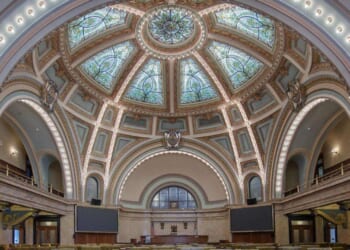Shattered by a war with Israel last year and a six-year depression, Lebanon recently opened a new wing in the National Museum of Beirut. Yes, amid both war and economic destruction, the tiny Mediterranean country decided that showcasing Lebanese modern art was one way to create a common identity in a religiously diverse and torn nation.
The new exhibit serves as “a reminder that there is something healing about remembering what is still good, what we still have,” said Juliana Khalaf, co-director of the Beirut Museum of Art, which collected the works for the new space.
Lebanon is now in the midst of an urgent identity-building process ever since a Nov. 27 ceasefire between Israel and the Iran-backed militia group Hezbollah that dominates the minority Shiites. A new reformist government is eager to bring the group’s fighters and weapons into the national army in order to gain foreign assistance for badly needed reconstruction.
President Joseph Aoun praises Hezbollah for cooperating so far with the Lebanese army. The group, whose top ranks were killed by Israel, has handed over more than half of its positions to the army. One reason: It has lost much of its support from Iran as well as help from Syria after the December collapse of a friendly regime there.
In a message to Hezbollah last month, the head of Lebanon’s Change Movement party, Elie Mahfoud, stated, “Return to your true Lebanese identity and take off the Iranian cloak.”
Another leading politician, Fouad Makhzoumi, wrote on the platform X, “Let us confront wars and destruction with Lebanon’s most important characteristic: a culture of life.”
Lebanon, where top government positions are divvied up by sect, needs a new social contract, wrote Anthony Samrani, co-editor in chief of L’Orient Today this month. “We need to invent a new model of citizenship, one that goes beyond community allegiances without denying them, to enable us to manage more maturely our delicate and natural relationship with otherness.”
A big part of the country’s identity, he added, is plurality and an aspiration to freedom. “Ultimately, Lebanon is an idea before it is a country. And true ‘Lebanon-ization’ is not a disease but a cure.”
In one way, the new art hall at the national museum is a cure. It serves as a “sanctuary,” Ms. Khalaf told the publication Democracy in Exile, “where shared heritage and collective imagination could defy the silencing grip of violence.”







